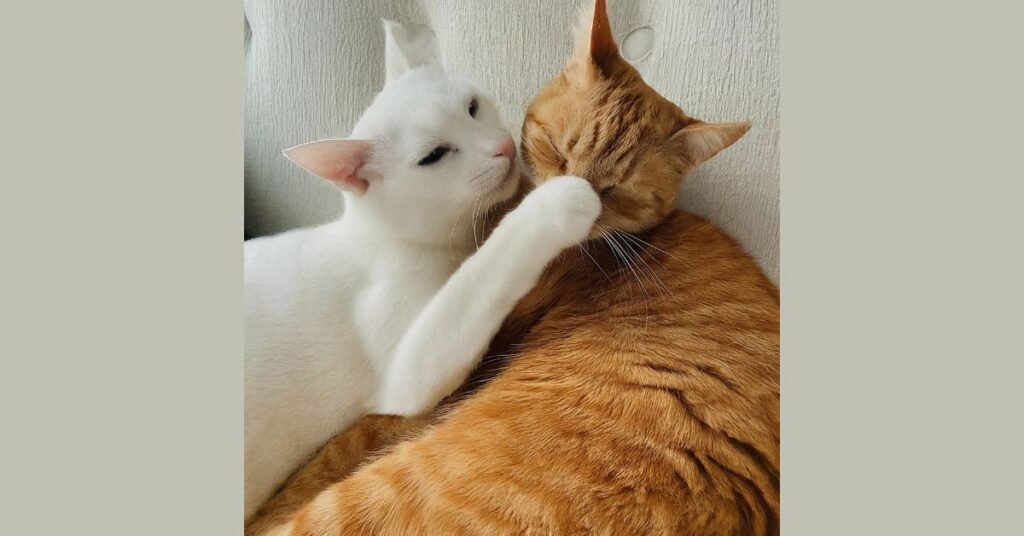Have you ever watched your cat meticulously groom themselves, their tongue darting across their fur with laser focus? Or perhaps you’ve witnessed a tender moment where your feline friend grooms another cat, leaving them both looking sleek and content. But why do cats groom? It turns out, this seemingly simple act is far more complex than it appears. For cats, grooming is a way of communicating, bonding, and even maintaining hygiene. It’s a secret language spoken entirely through scent, and by understanding this language, you can gain a deeper appreciation for your cat’s behavior.
The Power of Pheromones
Cats have specialized glands all over their bodies that produce pheromones – chemical signals that can be detected by other cats. These pheromones convey a wealth of information, including a cat’s mood, social status, and even their sex. When a cat grooms themselves, they spread these pheromones across their fur, creating a unique scent signature. This signature acts as a kind of identification badge, allowing other cats to recognize them.
Building Bonds Through Grooming
Grooming isn’t just a solitary activity for cats. It’s also a powerful social bonding tool. When cats groom each other, they’re not just cleaning each other’s fur; they’re exchanging scents. This exchange strengthens social bonds and helps create a sense of belonging within a group. Kittens learn the importance of grooming from their mothers, who groom them extensively during the first few weeks of life. This not only keeps them clean but also helps establish a close bond between mother and kitten.
Stress Relief and Relaxation
Grooming can also be a way for cats to manage stress and anxiety. The repetitive motion of licking their fur can have a calming effect, similar to how humans might find comfort in repetitive activities. Additionally, the act of grooming releases endorphins, the body’s natural feel-good chemicals. This can help your cat relax and feel more content.
Keeping Clean and Cool
Of course, grooming also serves a more basic purpose: hygiene. Cats are naturally clean animals, and their rough tongues are excellent at removing dirt, debris, and loose fur. This helps prevent mats and tangles, which can be uncomfortable for cats. Additionally, grooming helps cats regulate their body temperature. As they lick their fur, saliva evaporates, creating a cooling effect, which is especially helpful in warmer weather.
Understanding When Grooming Becomes Excessive
While grooming is a normal and healthy behavior for cats, excessive grooming can sometimes be a sign of an underlying issue. If you notice your cat grooming themselves to the point where they’re developing bald patches or sores, it’s important to consult your veterinarian. This could be a sign of stress, anxiety, allergies, skin conditions, or even parasites.
FAQ
1. Why does my cat groom me?
Cats often groom their humans as a sign of affection and trust. They see you as part of their social group and want to share their scent with you.
2. Should I groom my cat?
Regular brushing can help remove loose fur and prevent mats, especially in longhaired cats. However, most cats are quite capable of keeping themselves clean.
3. My cat hates being groomed! What can I do?
Some cats simply dislike being handled. Start slow and focus on areas your cat tolerates. Use a gentle brush and positive reinforcement with treats or praise.
4. My cats are constantly grooming each other. Is this normal?
Yes! Mutual grooming is a sign of a strong social bond between cats. It helps them relax, strengthen their relationship, and exchange scents.
5. How can I tell if my cat’s grooming is excessive?
If your cat is grooming themselves to the point where they’re losing fur or developing sores, it’s a sign of excessive grooming. Consult your veterinarian to rule out any underlying medical conditions.
Conclusion
By understanding the secret language of scents, you can gain a deeper appreciation for your cat’s grooming behavior. It’s more than just cleaning; it’s a way for them to communicate, bond, and manage stress. So the next time you see your cat meticulously grooming themselves or another feline friend, take a moment to appreciate this fascinating form of feline communication.

